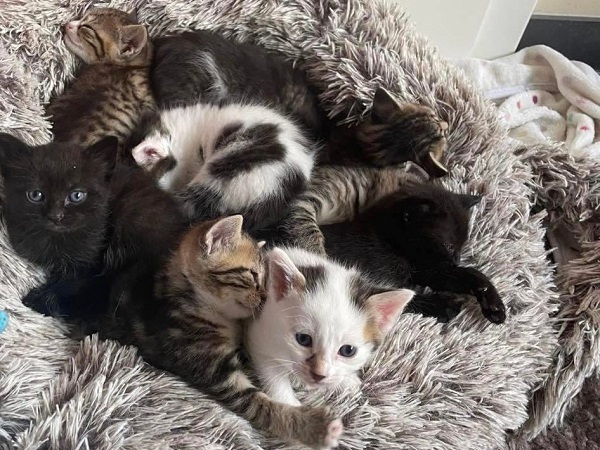 Credit: Een Herz vir Streuner
Credit: Een Herz vir Streuner
Today, Monday 8 August 2022, is International Cat Day, an annual celebration created 20 years ago by the International Fund for Animal Welfare; the aim of this international day, which is now under the custodianship of British non-profit organisation International Cat Care, is to raise awareness about ways to help and protect cats.
The theme of this year’s International Cat Day is "Cat friendly resources", i.e. ensuring cats are provided with the essential resources they require to stay physically and mentally healthy.
Whilst Chronicle.lu was unable to find official statistics concerning how many domestic cats there are currently in Luxembourg, two local animal welfare organisations with a specific focus on supporting and protecting cats spoke to us about the current situation of stray cats in the Grand Duchy.
Nadja Burg, President of Een Herz vir Streuner (a heart for strays) Asbl, estimated that there are about 10,000 stray cats in Luxembourg. She emphasised the need to follow the 2018 animal protection law which stipulates that all cats have to be microchipped and every cat with access to the outdoors must be neutered or spayed. "That's really important", she said, adding that responsibly adopting cats (or any pet), i.e. from animal shelters or animal welfare organisations, was equally important. She argued that adopting animals from such organisations, as opposed to taking a cat or dog from a friend or a farmer, was the only guarantee that these animals are vaccinated, microchipped and tested for relevant illnesses. "That's the reason it's really important to make a responsible adoption of cats", she reiterated. "To help animal welfare with that and to be sure what you get".
Nadja also recalled that all animal shelters in Luxembourg are currently full and there is no availability left with foster families at animal welfare organisations such as Een Herz vir Streuner: "If people don't adopt [responsibly], we can't help anymore". Over a twelve-month period, Een Herz vir Streuner caught, neutered and microchipped 850 stray cats in Luxembourg, the total cost of which was approximately €77,300. An additional €30,000 was needed for various vaccinations, operations and food products for the stray cats and kittens for which the non-profit and its foster families care.
Denise Hengel, President of Mini-Miez Asbl, confirmed that adoptions had slowed down over the summer period and that the non-profit's foster homes were full at present: "That is sad because as long as we don't place the current babies [in new homes], we cannot take in any [others] who would need our help". She was hopeful that adoptions would increase after the summer break but also expressed concern over the birth of new kittens in autumn.
Denise confirmed that part of the problem was not enough pet owners neutering their cats, despite the 2018 law. "We have a law, but what good is that without controls?" she said, adding that farmers were not obligated to neuter their cats even though a lot of stray kittens came from farms. Another part of the problem is simply that not enough people are actually familiar with this animal protection law, she lamented.
Recently, Luxembourg's animal shelters and animal welfare organisations launched a joint petition calling for a national action plan in response to full shelters and foster homes paired with decreasing adoptions and an increasing number of unneutered cats and new-born kittens.
The law of 27 June 2018 on the protection of animals (available here, in French), the purpose of which is "to ensure the dignity, protection of life, safety and well-being of animals" (namely vertebrate animals and cephalopods), outlines the various rules regarding the keeping / ownership of animals, required authorisations (for example for commercial activity involving animals), the transportation of animals, operations on animals and animal testing, among other things.
The Grand Ducal regulation of 5 December 2018 determining the conditions of owning an animal (available here, in French) goes into more detail about keeping or owning specific animals, including dogs and cats. Concerning the latter, the regulation stipulates that "all cats must be identified by electronic chip" and "any cat having access to the outside must be neutered or sterilised". However, "identification, castration and sterilisation do not apply to stray cats on farms", according to the regulation.








